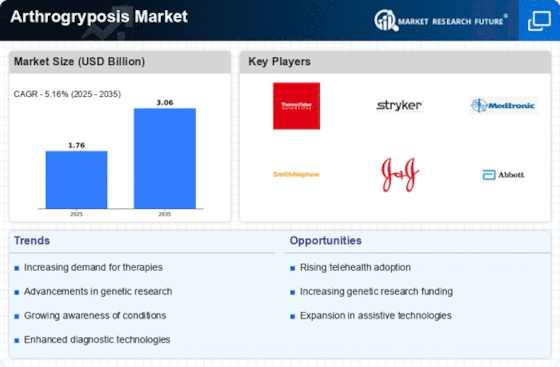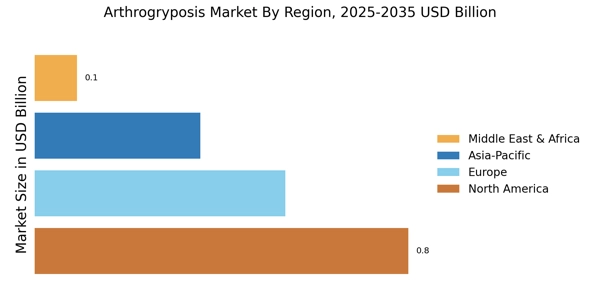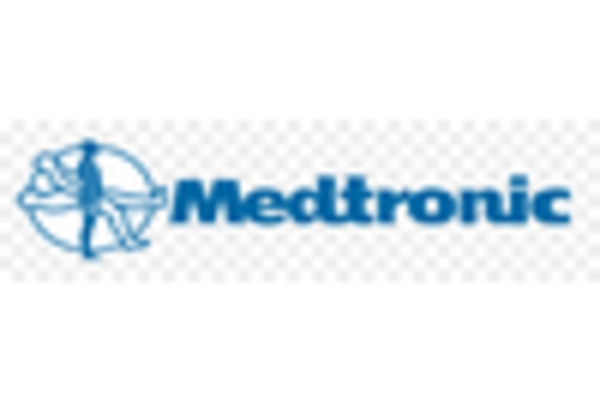Growing Awareness and Advocacy
The rise in awareness and advocacy for arthrogryposis is a crucial driver for the Arthrogryposis Market. Organizations dedicated to educating the public and healthcare professionals about the condition are playing a vital role in increasing diagnosis rates. This heightened awareness leads to earlier interventions, which can significantly improve patient outcomes. Additionally, advocacy groups are instrumental in promoting research funding and policy changes that support individuals with arthrogryposis. As more stakeholders engage in these efforts, the demand for specialized treatments and services within the Arthrogryposis Market is likely to grow, fostering a more supportive environment for affected individuals.
Advancements in Medical Technology
Technological innovations in medical devices and treatment methodologies are significantly influencing the Arthrogryposis Market. The development of advanced surgical techniques, such as minimally invasive procedures, has improved patient outcomes and reduced recovery times. Furthermore, the introduction of cutting-edge rehabilitation technologies, including robotic-assisted therapy and 3D-printed orthotics, is enhancing the quality of life for individuals with arthrogryposis. Market data indicates that the medical device segment is projected to witness substantial growth, driven by these advancements. As healthcare providers increasingly adopt these technologies, the Arthrogryposis Market is expected to expand, offering new opportunities for manufacturers and healthcare professionals alike.
Increasing Prevalence of Arthrogryposis
The rising incidence of arthrogryposis is a pivotal driver for the Arthrogryposis Market. Recent estimates suggest that arthrogryposis affects approximately 1 in 3,000 live births, indicating a notable prevalence rate. This increasing number of diagnosed cases necessitates enhanced treatment options and healthcare services, thereby propelling market growth. As awareness of the condition expands, more individuals are seeking medical intervention, which further stimulates demand for specialized therapies and assistive devices. The growing population of patients with arthrogryposis is likely to create a sustained need for innovative solutions within the Arthrogryposis Market, fostering advancements in both surgical and non-surgical treatment modalities.
Rising Demand for Supportive Care Services
The demand for supportive care services for individuals with arthrogryposis is on the rise, serving as a key driver for the Arthrogryposis Market. As patients require comprehensive care that includes physical therapy, occupational therapy, and psychological support, healthcare providers are expanding their service offerings. This trend is reflected in the increasing number of rehabilitation centers and specialized clinics dedicated to treating arthrogryposis. Market data suggests that the supportive care segment is experiencing growth, driven by the need for holistic approaches to treatment. Consequently, the Arthrogryposis Market is likely to see a surge in service-oriented solutions that cater to the diverse needs of patients.
Increased Research and Development Investments
Investment in research and development (R&D) for arthrogryposis treatments is a significant driver of the Arthrogryposis Market. Pharmaceutical companies and research institutions are increasingly focusing on developing novel therapies, including gene therapy and regenerative medicine approaches. This trend is supported by government initiatives aimed at promoting innovation in rare diseases. Market analysis indicates that R&D spending in this area is expected to rise, leading to the introduction of new treatment options that could transform patient care. As these investments yield results, the Arthrogryposis Market is poised for growth, with a broader array of therapeutic solutions becoming available to patients.

















